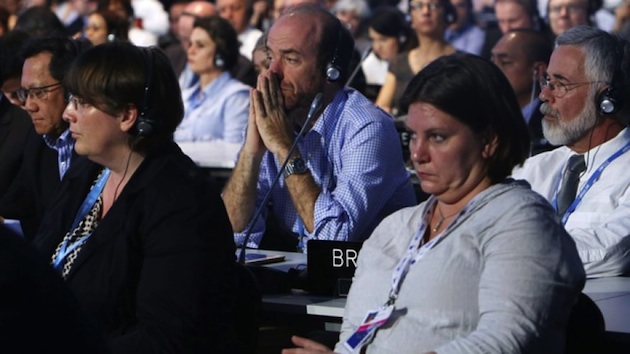

December 13, 2014: Delegates attend the U.N. Climate Change Conference in Lima, Peru. (AP Photo/Juan Karita)
LIMA, Peru – After developed nations rejected language in an initial proposal, late-night climate change talks at the U.N. in Peru resulted in an early Sunday compromise. Negotiators from member nations struck a deal that sets the stage for a global climate pact in Paris next year.
The two-week session in Lima aimed to reach agreement on what constituted each nation’s responsibility had they pledged to submit to a global climate change pact, which is widely expected to be adopted in Paris. But, ironically, several developing nations were up-in-arms over a draft decision they claimed allowed rich nations to shirk their responsibilities, while expecting poor countries to do too much.
While it is true that Western nations have historically been responsible for emitting the most, it is currently developing nations that pump the most CO2 emissions into the air. Up until now, developed nations have conceded their increased role in pollution as developing nations attempt to grow their economies and lift millions of people out of poverty. Unfortunately, more often than not, a few of each nation’s elite get extremely rich, while still needing to receive billions (total) in international aid to combat poverty.
“We need a permanent arrangement to help the poorest of the world,” said Ian Fry, a negotiator for the Pacific Island nation of Tuvalu.
The fourth draft, which was presented by Peru’s environment minister, was given to members just before midnight. Of those who still remained in the body of delegates, they had only an hour to review it. The final draft contained language that stated countries have “common but differentiated responsibilities” to deal with global warming, otherwise called climate change when convenient. However, it also restored language demanded by small island states that are at greater risk of being flooded by rising sea levels, which instituted a “loss and damage” mechanism.
It is the same language the U.S. and other member states agreed upon in last year’s talks in Poland.
However, the final draft undoubtedly weakened the language of responsibility, changing the phrase “shall” to “may” include quantifiable information showing how countries intend to meet their emissions goals. China, who is now the world’s largest economy on top of the world’s largest emitter of CO2, led other major developing countries to oppose a plan for a review process that would allow the pledges to be compared against one another before Paris.
Now, the new draft states that all pledges would be reviewed only a month prior to the anticipated meeting in Paris to assess their combined effect on climate change. Climate change activists are not happy.
“I think it’s definitely watered down from what we expected,” said Alden Meyer of the Union of Concerned Scientists.
“The text went from weak to weaker to weakest,” said Sam Smith, the chief of climate policy for the environmental group WWF. “And it’s very weak indeed.”
The Obama administration had hoped to build on momentum from last month’s joint U.S.-China deal on emissions targets, but it faded quickly in Lima if it was ever there to begin with. Speaking in Lima on Thursday, U.S. Secretary of State John Kerry said addressing the problem of climate change was “everyone’s responsibility, because it’s the net amount of carbon that matters, not each country’s share.”







